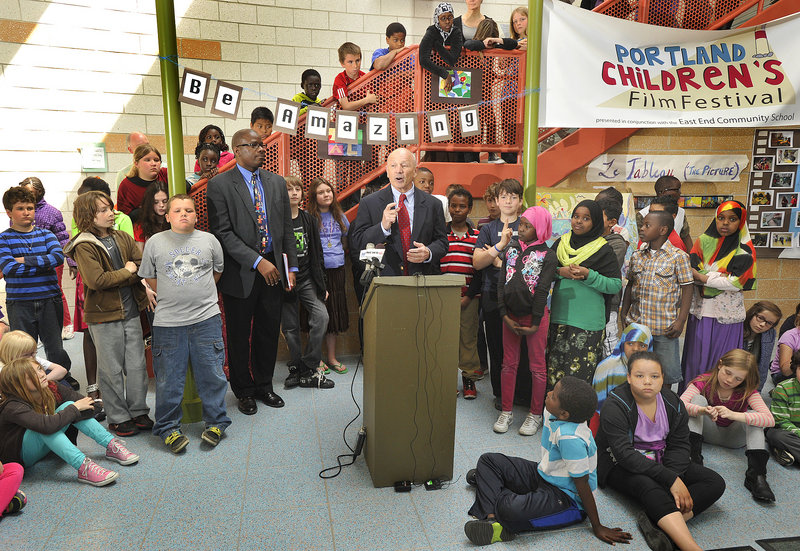Voters in Portland, Scarborough and Cape Elizabeth will decide Tuesday whether to approve school budget proposals or send them back for more work.
They also will be asked whether they want to continue voting on school budgets in future years, or let elected officials make the decisions.
The communities are dealing with differing local issues, such as dozens of job cuts in Portland’s proposal. But they all are struggling with the uncertainty of proposed state spending cuts that could force painful budget revisions in June.
In Portland, Mayor Michael Brennan and school Superintendent Emmanuel Caulk urged residents during a news conference Monday to vote in support of the $96.4 million school budget proposed for next year. “I hope the citizens of Portland show strong support for the budget,” Brennan said.
Portland’s proposed budget would increase the schools’ share of the city property tax rate by 3 percent, adding $58 to the annual tax bill for a home with an assessed value of $200,000. At the same time, however, it would cut dozens of positions to help pay for raises and other increasing costs.
In Scarborough, voters will weigh in on a $38.9 million budget proposal, a 4.24 percent increase over the current budget. That would increase the school’s portion of the property tax rate by 75 cents, adding $150 to the tax bill of a home valued at $200,000.
School Board finance chairman Chris Caiazzo said the district’s budget does not include any staff cuts and maintains funding for infrastructure.
In Cape Elizabeth, voters will take up a $22.5 million budget proposal, which is up 3.5 percent over the current budget. The proposed budget would add 46 cents to the property tax rate, or $92 to the tax bill of a home valued at $200,000.
School districts have taken different approaches to possible cuts in state funding, including a proposal to shift the cost of teacher retirement contributions from the state to the individual districts. Cape Elizabeth budgeted $300,000 for a potential shift in retirement costs, but Portland and Scarborough did not and would have to revise their budgets later if the cuts are adopted.
In Portland, flanked by a diverse student body at East End Community School, Brennan and Caulk touted the positive aspects of the school budget.
Caulk said the proposed budget maintains funding for pre-kindergarten programs and adult education, preserves middle school class sizes and offers internships, job shadows and seminars to high school students. The budget also invests in science, technology, engineering and math, as well as arts, world languages, physical education, sports and co-curricular activities, he said.
The budget also includes deep cuts in an effort to pay for nearly $8 million in cost increases, including $1.7 million in raises for teachers. Staff reductions are still being calculated, but the district estimates that more than 50 locally funded and 15 grant-funded full-time positions are on the chopping block.
Additional cuts may be needed if several state budget proposals are approved by the Legislature. A decision to shift teacher retirement costs to municipalities would add $1.3 million to the Portland school budget.
School budget referendum votes are required under the Maine School Administrative Reorganization Law, enacted in 2007 under former Gov. John Baldacci, as a way to increase transparency and accountability. Every three years, voters can decide whether to keep the process or not.
Portland voters were last asked in 2010, and the referendum was maintained by 10 votes. Last year, only 3.12 percent of the city’s 48,000 registered voters turned out for the referendum, and the city spent upwards of $15,000 on the election.
While Brennan asked residents to support the school budget, he also asked they vote against continuing the school budget referendum process. The city elects school officials to draft budgets, he said.
“For the state to impose a referendum process on the city, it’s a needless expenditure and a needless process,” Brennan said.
Scarborough officials, however, are recommending that residents vote to keep the referendum process, said Caiazzo, the board’s finance chairman.
“I think it’s very important (the budget) goes to referendum,” he said. “It’s a good validation.”
— Leslie Bridgers contributed to this report.
Randy Billings can be contacted at 791-6346 or at:
rbillings@mainetoday.com
Twitter: @randybillings
Send questions/comments to the editors.



